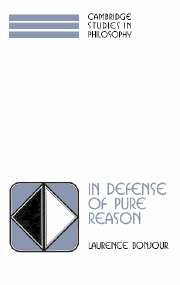Book contents
- Frontmatter
- Contents
- Preface
- Acknowledgments
- 1 Introduction: the problem of a priori justification
- 2 In search of moderate empiricism
- 3 Quine and radical empiricism
- 4 A moderate rationalism
- 5 Epistemological objections to rationalism
- 6 Metaphysical objections to rationalism
- 7 The justification of induction
- Appendix: Non-Euclidean geometry and relativity
- References
- Index
6 - Metaphysical objections to rationalism
Published online by Cambridge University Press: 08 January 2010
- Frontmatter
- Contents
- Preface
- Acknowledgments
- 1 Introduction: the problem of a priori justification
- 2 In search of moderate empiricism
- 3 Quine and radical empiricism
- 4 A moderate rationalism
- 5 Epistemological objections to rationalism
- 6 Metaphysical objections to rationalism
- 7 The justification of induction
- Appendix: Non-Euclidean geometry and relativity
- References
- Index
Summary
INTRODUCTION
The main conclusion of the preceding chapter was that the distinctively epistemological objections to rationalism, while perhaps not entirely without force, are very far from being decisive. Indeed, it is more natural to construe the epistemological objections, taken as a group, as merely revealing various limitations of our a priori capacities. These limitations are no doubt unfortunate, but they cannot plausibly be construed as serious reasons for taking the quixotic step of abandoning rational thought altogether, or at least any claim of cogency on its behalf – which is what we have seen that the rejection of rationalism would amount to.
In any case, though such a conjecture would be impossible to verify, it seems to me likely that the reasons for the widespread dismissal of rationalism lie on the metaphysical rather than the epistemological side of the ledger. I have already voiced the suspicion that the intellectual motives for the rejection of rationalism lie more in the realm of fashion than of argument, but even the relevant fashions seem primarily metaphysical in character. My purpose in this chapter is to examine and evaluate some of these metaphysical fashions and objections.
As was the case with the epistemological objections, the metaphysical objections to rationalism are only rarely spelled out and developed in any detail.
- Type
- Chapter
- Information
- In Defense of Pure ReasonA Rationalist Account of A Priori Justification, pp. 153 - 186Publisher: Cambridge University PressPrint publication year: 1997



